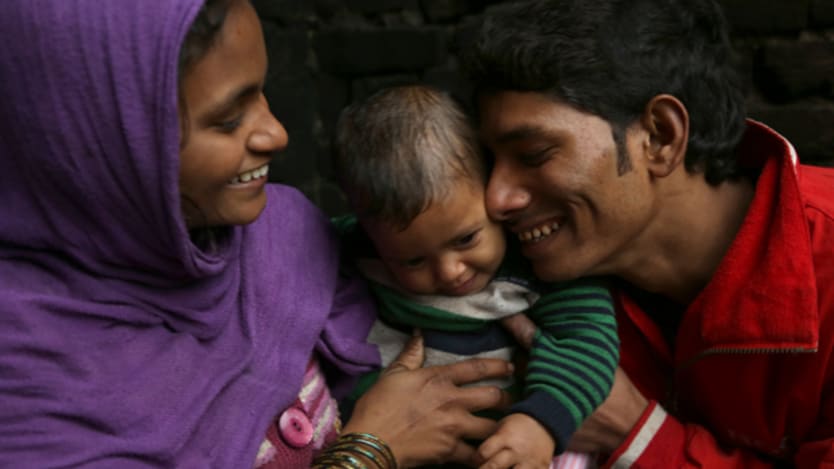
Maya and her husband live in a small overcrowded slum in Uttar Pradesh, India, with their four children amid open drains, air thickened with the stench of refuse and piles of garbage.
The slum is home to around 400 families, all working as rag pickers — a voiceless community living on occupied land, largely invisible to the world around them. But a chance meeting with Radha, a community worker supported by the Bill & Melinda Gates Foundation-funded Urban Health Initiative, has created ripples of hope. Maya speaks animatedly about securing a better future for her children.
She recently underwent voluntary sterilization at the district women’s hospital, one of the many contraceptive options offered to women by UHI. Maya now helps Radha counsel other women in her community who want to time and space their births on the different methods of contraception available to them, so they can chose one that best fits their needs and lifestyle. She also provides them with information on where they can access their preferred method.
What seemed like a chance meeting for Maya was actually part of a systematically designed effort by UHI to identify and reach all urban poor settlements and women living in urban poverty clusters that lack even the most basic health and sanitation services. Once the registered and unregistered slums, temporary settlements and poverty clusters were identified and mapped, the focus was then to reach women with an unmet need for family planning. In Uttar Pradesh, only 30.1 percent of urban poor women use a modern contraceptive method as compared with 51.2 percent of the nonpoor. Unmet needs for family planning among the urban poor are nearly twice the amount compared with the urban nonpoor (13.8 percent and 6.2 percent, respectively).
Improving equitable access to family planning services and supplies as well as reducing the gap in unmet need for family planning services between the poor and the nonpoor are core UHI objectives. Community workers work diligently to reach all women in the slums with counseling services and referrals for various family planning methods, products and providers that are available at a range of affordable price options. Providing information to marginalized women living in slums, coupled with a newfound ability to choose from a variety of affordable contraceptive methods, proved to be a game changer. According to data compiled by local nongovernmental organizations, community workers reported an increase in modern contraceptive use from 35.6 percent in 2011 to 55.4 percent in 2014.
See more from this series:
● Universal access to reproductive health care: A global obligation and opportunity
Counselors in high-volume government facilities supported by UHI have demonstrated their value by greatly boosting the number of family planning acceptors over time. For uneducated women without the confidence to deal with the confusing labyrinth of large hospitals, these counselors serve as sisters-in-arms to women like Maya. They patiently discuss family planning options, facilitate choice based on their individual needs and encourage providers to offer and counsel women on a broad range of family planning methods.
This strategy is paying off.
Maya was glad to learn that voluntary sterilization services were available on the day that she was referred to a facility by her community worker. UHI helped both government and private providers organize and implement fixed services for sterilization and intrauterine contraceptive device, aligned with the government’s Static Day Program. For Maya and other clients, this means that quality services will be provided at reliable times and predictable costs, and that they won’t be turned away. To meet the increased demand and satisfy clients, providers have subsequently developed higher standards for the timeliness and quality of services provided.
However, for many women, the cost of family planning methods remains a key barrier to use. This includes the cost of services and commodities, the cost of transport to and from facilities, and lost wages for time away from work. To reduce cost-related barriers, UHI partnered with a number of private facilities to service the urban poor at lower rates. For example, the cost of injectable contraceptives known as DPMA was brought down to less than $1 per dose, providing more women with access to methods that are not provided by the government. For women in slums, this means one more method is now available to them. As a result, 2.6 percent of women living in Uttar Pradesh slums report using DPMA, compared with 0.1 percent reported use across India.
What makes UHI unique is its collaboration and seamless orchestration with the Indian government’s plans and policies. The program actively demonstrates to community workers, counselors, providers, administrators and policymakers how reaching every Maya in the urban slums of Uttar Pradesh can be achieved within a short period. As the world looks closely at India’s march toward its Family Planning 2020 commitment — and the state of Uttar Pradesh, in particular — it’s time to show that strategies to improve access to and demand for quality family planning services and supplies are demonstrable, replicable and achievable.
This article is part of a series by the Bill & Melinda Gates Foundation that culminates on World Contraception Day. Check out more stories about global health and other important issues at the Impatient Optimists blog.
Join the Devex community and access more in-depth analysis, breaking news and business advice — and a host of other services — on international development, humanitarian aid and global health.

